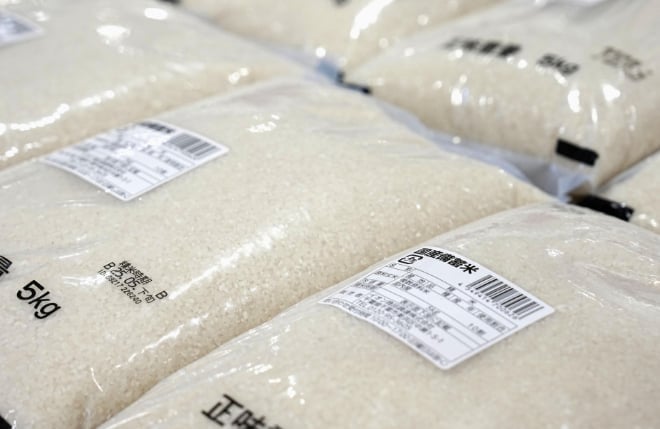December 16, 2025 | 22:49 GMT +7
December 16, 2025 | 22:49 GMT +7
Hotline: 0913.378.918
December 16, 2025 | 22:49 GMT +7
Hotline: 0913.378.918

Bags of reserve rice released from government stockpiles through direct contracts with retailers hit the shelves at an Aeon supermarket in the western Japan city of Osaka on June 2, 2025. Photo: Kyodo.
As households increasingly complain about rice prices that have doubled over the past year, more than 40 percent of respondents worried that consumers may start shunning the product.
The survey, conducted for a week from May 12 and targeting 188 companies producing rice for staple food purposes, comes as the government grapples with bringing down the price that averages 4,200 yen ($29) per 5 kilograms.
In late May, the government took the unusual step of starting to sell rice stockpiles through direct sales contracts with retailers in a bid to curb prices.
Kazushi Saito, head of the association, said he believes that the price tag deemed reasonable for both producers and consumers is 3,000 yen per 5 kg.
According to the survey, 53.7 percent of respondents said the consumer purchasing price of the 2024 harvest is "too high," followed by 30.9 percent who considered the price "high, but appropriate."
Forging a consensus on the appropriate price level may prove difficult, however, with Toru Yamano, the head of the powerful farm lobbying group, Central Union of Agricultural Cooperatives, saying in May, "I don't necessarily think it's high."
In a multiple-choice question asking farm companies' concerns in the rice-growing business, 77.1 percent -- the largest group of respondents -- pointed to the high costs of purchasing facilities and machines for farming, while 55.3 percent worried about a sharp fall in rice price following overproduction.
A total of 43.1 percent expressed fear that consumers could stop buying rice because of the soaring price.
KyodoNews

(VAN) Climate change, saline intrusion, and unsustainable farming practices are depleting agricultural land in the Mekong Delta. Restoring soil health is a key solution for the future of agriculture.

(VAN) Agroforestry coffee not only enhances coffee quality but also helps farmers in Quang Tri enter carbon credit market with high expectations.

(VAN) Towards Net Zero 2050, fertilizer manufacturers are proactively developing bio-based products, reducing emissions, and demonstrating responsibility to the environment.

(VAN) The smart rice cultivation model, which reduces methane emissions and aims at developing agricultural carbon credits, has been deployed in Thai Nguyen province and delivered positive results.

(VAN) The purpose of this visit is to unify the proposal for a technical assistance project supporting sustainable agricultural and forestry development in Angola.
![Unlocking carbon credit potential: [3] New direction for rice production](https://t.ex-cdn.com/nongnghiepmoitruong.vn/608w/files/huyenvt (e)/2025/12/10/3428-2-092319_209.jpg)
(VAN) Low-carbon rice models in Thanh Hoa are opening up opportunities for a green, circular agriculture, aiming at carbon credit generation.
![Unlocking carbon credit potential: [2] Story of Pu Hu forest](https://t.ex-cdn.com/nongnghiepmoitruong.vn/608w/files/huyenvt (e)/2025/12/09/3813-2-171042_611.jpg)
(VAN) Revenue from emission reductions has brought major changes to the Pu Hu Nature Reserve, from improving community livelihoods to strengthening linkages for sustainable forest management.